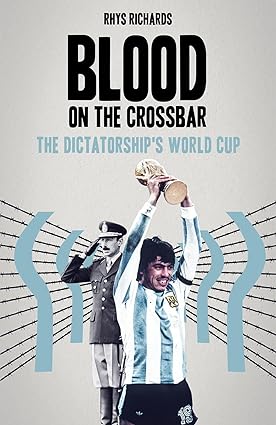Blood On The Crossbar: The Dictatorship’s World Cup by Rhys Richards
06/02/2024 - 5.03
Book Review by Alex Alexandrou

As the recent World Cup tournaments of 2018 and 2022, held in Russia and Qatar respectively, clearly demonstrated, you cannot separate football from politics and social justice issues. The same can be said of the 1978 tournament hosted by Argentina, just two years after a military coup that ousted the then President, Isabel Péron led to this nation once again coming under totalitarian rule.
Rhys Richards is to be congratulated on writing an account of this tournament that ensures whilst football plays a pivotal role, it is enhanced by the military, political and social elements that act as both brutal and intriguing pivots around the beautiful game. He also ensures for the older reader such as myself, we are transported back to collecting the Panini stickers for the tournament and the travails of the Scottish national team, including being undone by Peru through the thunderous boot of the legendary Teófilo Cubillas, as well as the magical solo dribble of Archie Gemmill ending in a goal against the Netherlands for this midfield pocket dynamo, that gave Scotland hope for a few minutes of qualifying for the next stage but all to no avail, for a second successive tournament.
However, I digress a little, as the book progresses, it is clear that the military junta was following Mussolini’s Fascist regime’s playbook for hosting the 1934 World Cup. There are clear parallels in terms of how a totalitarian government attempts to portray itself in a positive light to the outside world; utilising the tournament to bring a fractured society together through football; manipulating the media and the ensuing political narrative, as well as the obligatory accusations of “match fixing”, bribing and coercion of opposition players as well as referees, to bring about the inevitable victory for the home nation!
Most notably, in terms of a visit to Peru’s dressing room by the President of Argentina, General Jorge Videla and the former US Secretary of State, Henry Kissinger, prior to their 6-0 drubbing by the host nation, leading to Argentina’s second appearance in a World Cup final. Which in turn, led to more dubious actions and shenanigans to destabilize the host nation’s opponents – the Netherlands, relating to a protective wrist cast being worn by one of the Dutch players.
Whilst, the author takes the reader through the tournament with analysis of matches and the progress of the key protagonists on the field, he expertly intertwines this with the myriad subplots from both a national and international perspective. These include the attempts to ban and boycott the tournament with campaigns in nations such as France and the Netherlands; the disappearance, torture and murder of political opponents, those deemed subversives and journalists; and significantly, Las Madres de Plaza de Mayo movement which was formed in 1977, by mothers whose children had begun to “disappear” as the regime’s power took hold. The movement has marched and campaigned continuously to highlight the disappearance of their children during the junta’s reign of terror, in order to find them as most are presumed dead, seek justice for these crimes and highlight human rights violations.
This tome is a most welcome addition to the literature that deals with the relationship between football, the military, politics and society.
The book is published by Pitch Publishing and is available through the publisher’s store on Amazon - £18.99, hardback, £9.99, Kindle, 304 pages.
Alex Alexandrou is the Co-Founder and Chair of the Football and War Network


/prod01/wlvacuk/media/departments/digital-content-and-communications/images-2024/240328-Varsity-Line-Up-Resized.jpg)
/prod01/wlvacuk/media/departments/digital-content-and-communications/images-18-19/220325-Engineers_teach_thumbail.jpg)
/prod01/wlvacuk/media/departments/digital-content-and-communications/images-2024/240515-Spencer-Jones-Award-Resized.jpg)
/prod01/wlvacuk/media/departments/digital-content-and-communications/images-2024/240320-Uzbekistan-Resized.jpg)
/prod01/wlvacuk/media/departments/digital-content-and-communications/images-2024/240229-The-Link-Resized.jpg)
/prod01/wlvacuk/media/departments/digital-content-and-communications/images-2024/240516-Andy-Gibson-Resized.jpg)